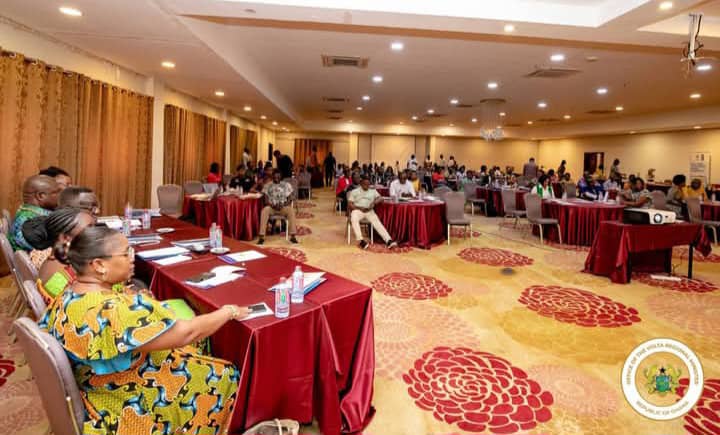By Maxwell Awumah
Ho, March 26, GNA – Mr James Gunu, the Volta Regional Minister, has entreated the National AfCFTA Coordination Office (NCO) to pay a special attention to the region and ensure that businesses occupy the forefront of the implementation of the African Continental Free Trade Area agreement.
He said the Volta Region had always represented and produced the best in the country – boasting of its history, the intellect and industrious spiritedness, which speaks volumes.
“You have our full support, and we expect nothing less than a deliberate effort to make the Volta Region, a model for AfCFTA success in Ghana.
Speaking at the Regional Dialogue on the AfCFTA Protocol on Women and Youth in Trade in Ho, Mr Gunu said all efforts should be harnessed to make the Region ‘Ghana’s Trade Hub,’ under AfCFTA.
“We have the strategic location, the industrious workforce, and the productive sectors to drive this agenda. What we need now is action—bold policies, strong partnerships, and an unshakable commitment to ensuring that every woman and young entrepreneur in this region has a fair shot at success in the African market.”
“Let us turn this dialogue into action and build an economic standpoint, where women and the youth are leaders, when MSMEs and entrepreneurs succeeds and therefore, there’s no limit the Region and nation could not achieve under AfCFTA.”
Mr Gunu pledged the Regional Coordinating Council’s commitment to supporting women and youth-led Micro, Small and Medium scale Enterprises (MSMEs) to leverage the AfCFTA Protocol on Women and Youth and work with all major actors.
“We will push for more trade facilitation initiatives, business incubation programmes, and financial inclusion measures tailored to the needs of women and young entrepreneurs in our region. Our doors are open, and our commitment is unwavering.”
The Regional Minister noted that to access markets alone was not enough leveraging but ensuring that women and youth-led businesses in the Region are equipped to compete through capacity building, knowledge-set and finance to scale-up as measures to advance.
He said opening up regional and continental markets, would create new demands and markets for goods and services produced in the region leading to business expansion, and more job avenues for the youth as well as stimulate the 24- hour economy policy as espoused by President John Dramani Mahama.
He described AfCFTA as the biggest trade opportunity of our lifetime, one that breaks down barriers, creates a single African market, and ensures that businesses, no matter size, could compete and thrive across the continent.
Ms Edem Attor, a representative of UNDP, disclosed that the engine for growth of economies was the private sector of which MSMEs, contributing about 50 per cent of the private output, nearly 70 per cent of employment, and about 90 per cent of businesses in the country.
She said the AFCFTA was a monumental initiative that had the power to reshape the economic landscape of Ghana and Africa by creating a single market of 1.3 billion people and a combined GDP of $3 trillion.
He said the AFCFTA represented unparalleled opportunities for African businesses to expand their horizons, increase their competitiveness, and scale their operations across the continent.
She reaffirmed UNDP’s continuous support towards the course of the tenets enshrined in the AfCFTA agreement now and into the future.

Ms Gonaja Sephora, Women and Youth in Trade Expert, AfCFTA Secretariat, enumerated challenges facing women and youth in trade SMEs as inadequate finance, limited or lack of disaggregated data by sex and age to support gender responsive trade policies, high cost of transportation logistics, complex customs procedures.
Others, she said was lack of infrastructure to support rural women and youth participation in trade, non-tariff barriers (NTBs), increased trading cost pushing women and youth traders into the informal economy, compliance with regulatory requirements as safety and quality standards as well as lack of digital drive.
She said the AfCFTA Protocol provided a legal framework for implementation of the agreement, inclusion of youth and women in policy-making decisions, availability and access to trade info and data, research on issues affecting women and youth in trade, technical assistance skills development, technology and development to integrate in regional value-chains, implement mechanisms to prevent, discourage, address, eliminate harassment for women in trade.
Ms Sephora indicated the wayforward was to create a conducive environment for women and young entrepreneurs, expanded market access, expansion of customer-base, promote sustainability of youth SMEs, value addition, increase competitiveness, integration into regional value chains, diversified business opportunities, increased investments and collaboration, skills and knowledge exchange, and easier access to input and resources.
Mr Jacob Gyamfi-Aidoo, Senior Advisor, NCO, disclosed that AfCFTA was crafted not to leave anyone behind, reason it had mainstreamed women and the youth into its protocols for greater operations.
The dialogue seeks to elicit concerns from women and the youth in trade into the AfCFTA implementation strategy to broaden participation and targeting for deliberate access into the continental market.
GNA
MA/CA